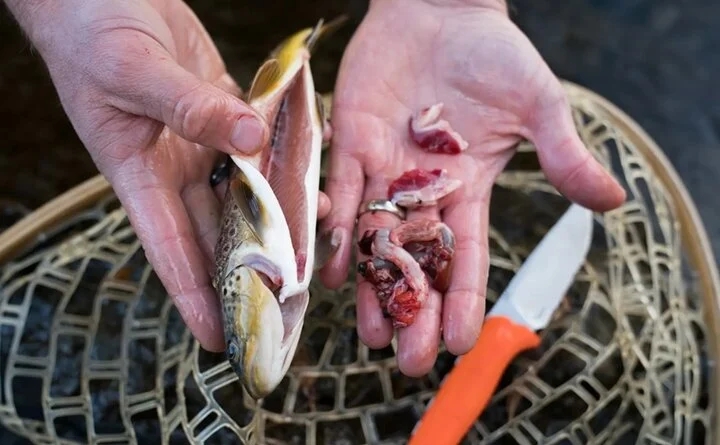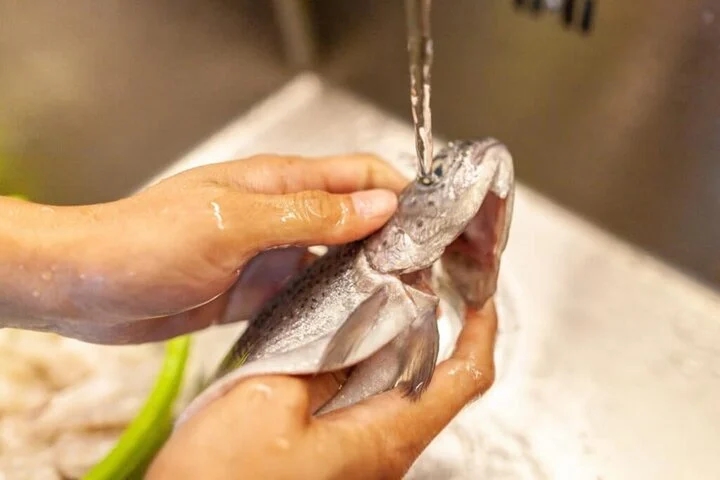Preparing fresh fish is a delicate process that requires attention to detail. If not handled properly, the dish can turn out to be unappetizingly fishy, diminishing its flavor and ruining the dining experience.
Parts of the Fish That Are Particularly Fishy and Need to Be Removed
If your cooked fish still has a strong fishy odor, it’s likely that the following parts weren’t properly removed during preparation:
Fish Gills
The gills are the first thing to go when preparing a fish. As they filter water for the fish to breathe, they tend to absorb a lot of blood and impurities from the water, resulting in a strong fishy smell.
To remove the gills, use a knife or scissors to cut close to the base of the gills, then gently pull them out. This step will help prevent the fishy odor from spreading to the meat during cooking.

The intestines are one of the fishiest parts. (Photo: The Meat Eater)
Fish Intestines
The intestines contain partially digested food and waste matter, making them extremely fishy and a potential source of contamination for the meat.
To remove the intestines, make a slit along the belly of the fish, from the anus to the gills, then gently use your fingers or a knife to remove them. After taking out the intestines, rinse the cavity thoroughly with cold water to eliminate any remaining waste and fishy odor.
For larger fish where the intestines are meant to be eaten, make sure to clean and remove any undigested food from within.
Black Membrane in the Belly
The black membrane inside the belly cavity contains fat and waste matter, contributing to a strong fishy smell. When preparing the fish, use a knife to scrape away this membrane. Leaving it intact will cause the fishy odor to permeate during cooking, diminishing the flavor of your dish.
Belly Fat
Fish fat, especially belly fat, can also be a source of fishiness. Removing excess fat will make the fish taste better when cooked.
When cleaning the fish, carefully inspect and trim away any visible fat deposits. This not only reduces fishiness but also creates a less greasy, more palatable dish.
Fish Scales
While not as fishy as the internal organs, scales can retain some of the fishy odor if not cleaned properly, affecting the overall quality of the dish.
Scaling the fish is essential before cooking. You can use a knife or a specialized scaling tool to remove the scales thoroughly. After scaling, rinse the fish under cold running water to wash away any remaining scales and debris.

Parts of the fish that are particularly fishy and should be discarded. (Photo: The Guardian)
Fish Blood
Pooled fish blood, especially along the spine, can contribute to a fishy odor. When rinsing the fish, pay extra attention to washing away any blood. Use a knife to gently scrape along the spine and crevices to release the blood, then rinse thoroughly with cold water to eliminate any remaining blood and impurities.
Additionally, remove the bloodline, the strip of red flesh along the spine, as it can also be a source of fishiness. Use a knife or scissors to cut it away, then rinse with cold water.
How to Clean and Get Rid of the Fishy Smell
The process of eliminating the fishy odor after removing the fishy parts is just as crucial to ensuring a delicious dish.
Rinse the Fish with Saltwater or Vinegar
After removing the fishy parts, rinse the fish with diluted saltwater or vinegar to neutralize the odor. Mix a small amount of salt or vinegar with water, soak the fish for a few minutes, then rinse with clean water. Not only do saltwater and vinegar help eliminate the fishy smell, but they also firm up the meat.

(Photo: The Wild Provides)
Marinate the Fish with Lemon or White Wine
Lemon juice or white wine are effective odor neutralizers. Soak or marinate the fish in either of these liquids for a few minutes to completely get rid of the fishy smell. They also add a nice flavor to your dish.
Use Ginger and Onion
When cooking the fish, adding ginger or onion can help mask the fishy odor and enhance the flavor. Ginger has warming properties and is great for neutralizing fishiness. Onion works similarly—add a few slices to the pot while cooking the fish.
Chill the Fish
After cleaning, the fish can be tightly wrapped and stored in the refrigerator for a short period before cooking. Chilling helps retain its freshness and reduces any remaining fishy odor.
According to VTC News





































